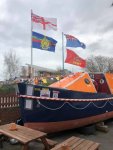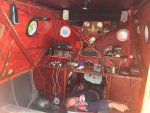Gary Fox
N/A
Yes they're good engines, capable of constant full-power running for months on end, with regular oil changes. I spent a whole season thrashing one on a passengercarrying narrowboat, 7 days a week of full revs, no issues at all. It was eventually replaced for cosmetic reasons by a Russel Newberry, which was a disaster.
There are plenty of mechanics with intimate knowledge of them, and cheap spares. Much better to find one of these in an old boat, than a 70's Volvo! The common PRM boxes are also very long lasting.
There are plenty of mechanics with intimate knowledge of them, and cheap spares. Much better to find one of these in an old boat, than a 70's Volvo! The common PRM boxes are also very long lasting.


